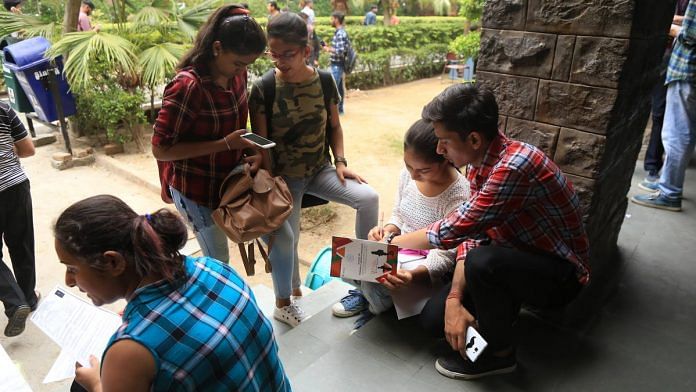New Delhi: The central government is working on a policy that, if implemented, could radically alter the face of higher education in the country.
The University Grants Commission (UGC) is developing a credit-based system that will allow students to study their course in different universities and get their degree from a completely different institution.
Under the system, students will be just required to earn a minimum number of credits for the completion of a degree. Once they secure enough credits to earn a degree, they can then surrender them to the institute that they want their degree from.
To implement the decision, the UGC has proposed to form a ‘National Academic Credit Bank’, which will be an online repository of data of students and details of the credits earned by them.
The UGC has constituted a committee to develop the policy. The committee has finalised a plan and is now working on overcoming the challenges in the implementation of the policy before announcing it.
A Choice Based Credit System (CBCS) already exists in the country, under which students need to earn a certain number of credits to complete a course. In engineering courses, a semester typically has 20-25 credits while the number is somewhere between 15-20 for non-technical courses such as humanities and basic sciences.
A student-centric approach
A member of the UGC committee told ThePrint that the system will be a “multiple entry, multiple exit” arrangement.
“Suppose a student enrols for psychology in a university and the course has three credits in one semester. The student can earn those three credits in that university and if she does not want to study there further, she can leave the university and complete the rest of the credits in some other place,” the official said.
“Ultimately, one needs to collect the minimum credits required to obtain a degree, surrender the credits to an institution and get the degree.”
For a student to get a degree from a particular institute, the institute should have the course in which the student wants to graduate and the credits should meet the academic requirement of the particular institute.
To earn credits in the current system, students are supposed to be present for a certain number of hours per week in the classroom, certain hours have to be for self-study and in the case of science and engineering subjects, lab work is mandatory.
Once the new system kicks in, students will have the freedom to complete these credits from places they wish to.
“The idea behind bringing such a policy is to ensure a more student-centric approach to learning,” the official added. “Instead of learning what the teachers want them to learn, students can actually choose what they want to learn.”
Also read: Department-wise hiring in universities grave miscarriage of justice, Modi govt to argue in SC
Challenges in implementation
There are, however, a number of challenges that the UGC will have to overcome.
To begin with, education institutions will face a problem in understanding how the system works and how they can adopt it since something like this is unheard of in India. Students will also need to be aware that they can take such an option.
“We will also have to work out some technical modalities like the validity of credits,” the official said. “Suppose a student has earned 40 credits and drops from the course in between but wants to get a degree, then at that point, for how many years will the credit be valid. This will have to be figured out. Also, when students have a lot of options to chose from, it is possible that they will be confused.”
Also read: Govt hikes research fellowship by 20% after protests by scholars



